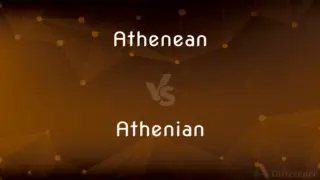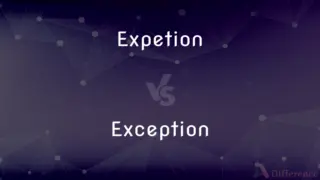Sheild vs. Shield — Which is Correct Spelling?
Edited by Tayyaba Rehman — By Fiza Rafique — Updated on April 1, 2024
"Sheild" is an incorrect spelling. The correct spelling is "Shield," which refers to a protective device or barrier.

Table of Contents
Which is correct: Sheild or Shield
How to spell Shield?

Sheild
Incorrect Spelling

Shield
Correct Spelling
ADVERTISEMENT
Key Differences
Think of the word "field" and recall the "ie" order in it.
Always remember "i before e" doesn't apply here; it's "Shield" not "Sheild."
Visualize a knight with a shield; recall the correct spelling as you imagine it.
Associate the word with "Shield your eyes," ensuring the right order.
Use mnemonic: "Safely Hold Every Individual, Letting Danger go."
ADVERTISEMENT
How Do You Spell Shield Correctly?
Incorrect: The sheild was made of sturdy oak.
Correct: The shield was made of sturdy oak.
Incorrect: He carried a sheild into battle.
Correct: He carried a shield into battle.
Incorrect: A sheild can provide protection against arrows.
Correct: A shield can provide protection against arrows.
Incorrect: In the game, you can upgrade your sheild for better defense.
Correct: In the game, you can upgrade your shield for better defense.
Shield Definitions
A piece of armor carried by warriors.
Knights once used shields in battle.
A broad piece of armor made of rigid material and strapped to the arm or carried in the hand for protection against hurled or thrusted weapons.
A person or thing that provides protection.
A steel sheet attached to an artillery piece to protect gunners from small-arms fire and shrapnel.
(Physics) A wall or housing of concrete or lead built around a nuclear reactor to prevent the escape of radiation.
(Electronics) A structure or arrangement of metal plates or mesh designed to protect a piece of electronic equipment from electrostatic or magnetic interference.
A pad worn, as at the armpits, to protect a garment from perspiration.
A sanitary napkin.
(Zoology) A protective plate or similar hard outer covering; a scute or scutellum.
An escutcheon.
A decorative emblem that often serves to identify an organization or a government.
A police officer's badge.
(Geology) The ancient, stable, interior layer of continents composed of primarily Precambrian igneous or metamorphic rocks. Also called continental shield.
To protect from being attacked, exposed to danger, or subjected to difficulty
"a policymaking elite whose families and purses are shielded from the sacrifices war entails" (Uwe E. Reinhardt).
To cover up; conceal
"Though many eyes were watching, none could pierce the halo of morning sunlight that surrounded and shielded the hawk" (Peter Dunne).
To act or serve as a shield or safeguard.
Anything that protects or defends; defense; shelter; protection.
A broad piece of defensive armor, held in hand, formerly in general use in war, for the protection of the body.
(figurative) One who protects or defends.
(lichenology) In lichens, a hardened cup or disk surrounded by a rim and containing the fructification, or asci.
A framework used to protect workmen in making an adit under ground, and capable of being pushed along as excavation progresses.
(science fiction) A field of energy that protects or defends.
A shape like that of a shield; usually, an inverted triangle with sides that curve inward to form a pointed bottom, commonly used for police identifications and company logos.
(heraldry) The escutcheon or field on which are placed the bearings in coats of arms.
A toilet seat.
A spot resembling, or having the form of a shield.
(obsolete) A coin, the old French crown, or écu, having on one side the figure of a shield.
(transport) A sign or symbol, usually containing numbers and sometimes letters, identifying a highway route.
A police badge.
(geology) A large expanse of exposed stable Precambrian rock.
(geology) A wide and relatively low-profiled volcano, usually composed entirely of lava flows.
A place with a toilet seat: an outhouse; a lavatory.
Parts at the front and back of a vehicle which are meant to absorb the impact of a collision
To protect, to defend.
(electricity) to protect from the influence of
A broad piece of defensive armor, carried on the arm, - formerly in general use in war, for the protection of the body. See Buckler.
Now put your shields before your hearts and fight,With hearts more proof than shields.
Anything which protects or defends; defense; shelter; protection.
Figuratively, one who protects or defends.
Fear not, Abram; I am thy shield, and thy exceeding great reward.
In lichens, a Hardened cup or disk surrounded by a rim and containing the fructification, or asci.
The escutcheon or field on which are placed the bearings in coats of arms. Cf. Lozenge. See Illust. of Escutcheon.
A spot resembling, or having the form of, a shield.
A coin, the old French crown, or écu, having on one side the figure of a shield.
To cover with, or as with, a shield; to cover from danger; to defend; to protect from assault or injury.
Shouts of applause ran ringing through the field,To see the son the vanquished father shield.
A woman's shape doth shield thee.
To ward off; to keep off or out.
They brought with them their usual weeds, fit to shield the cold to which they had been inured.
To avert, as a misfortune; hence, as a supplicatory exclamation, forbid!
God shield that it should so befall.
God shield I should disturb devotion!
A protective covering or structure
Armor carried on the arm to intercept blows
Protect, hide, or conceal from danger or harm
Hold back a thought or feeling about;
She is harboring a grudge against him
A protective device designed to deflect or stop objects.
He raised his shield to block the arrows.
To protect from harm or danger.
She used an umbrella to shield from the rain.
A safeguard or protector.
The vaccine acted as a shield against the virus.
Something that covers or conceals.
The forest acted as a natural shield, hiding the camp.
Shield Meaning in a Sentence
The police officer used a shield during the riot to protect himself from debris.
Environmental protections act as a shield to preserve natural habitats.
In modern times, a metaphorical shield can refer to any means of protection.
The team worked together as a shield, defending their goal against the opposing team.
The superhero's shield is indestructible, able to withstand any force.
A shield is not only a piece of armor but also a symbol of protection in many cultures.
The knight's shield was adorned with the colors of his kingdom.
A shield volcano is so named because its broad, low profile resembles a warrior's shield.
Software firewalls serve as a digital shield against cyber attacks.
Sunscreen acts as a shield against harmful UV rays, protecting the skin.
Shield Idioms & Phrases
Under someone's shield
Being under the protection of someone.
Growing up, he always felt safe under his older brother's shield.
A double-edged shield
Describes a protective measure that can have both positive and negative consequences.
The new privacy law was a double-edged shield—it protected personal data but made research more difficult.
Shield of faith
A metaphorical shield representing spiritual protection.
In times of doubt, she relied on her shield of faith to remain strong.
Shield from harm
To protect or guard from danger or injury.
The mother did everything in her power to shield her children from harm.
Take up the shield
To prepare to defend or protect something.
The community took up the shield against the proposed harmful legislation.
Common Curiosities
Which vowel is used before Shield?
The vowel "i."
What is the root word of Shield?
The Old English word "scield."
What is the verb form of Shield?
To shield.
What is the plural form of Shield?
Shields.
Which conjunction is used with Shield?
Any conjunction can be used depending on the context.
Why is it called Shield?
It is derived from Old English "scield," meaning protector or defense.
What is the singular form of Shield?
Shield.
What is the pronunciation of Shield?
It's pronounced as /ʃiːld/.
Is Shield an adverb?
No.
Is Shield an abstract noun?
No, it's primarily concrete but can be used abstractly in some contexts.
Which article is used with Shield?
"A" or "the," depending on context.
What is a stressed syllable in Shield?
The entire word is stressed, as it's one syllable.
What is the opposite of Shield?
Expose or target.
What is the first form of Shield?
Shield (as a verb).
Which preposition is used with Shield?
"From," as in "shield from danger."
Is Shield a countable noun?
Yes.
What part of speech is Shield?
It can be a noun or a verb.
Is Shield a vowel or consonant?
Shield is a word containing both vowels and consonants.
Is Shield a collective noun?
No.
Is the word “Shield” a Direct object or an Indirect object?
It can be either, depending on the sentence.
What is another term for Shield?
Protector.
Is Shield a noun or adjective?
Shield can be both a noun (the protective device) and a verb (the act of protecting).
Is Shield a negative or positive word?
Neutral, though it often has a positive connotation of protection.
Is the Shield term a metaphor?
It can be used metaphorically, e.g., "He was her shield against the world."
Is the word Shield a gerund?
No.
What is the second form of Shield?
Shielded.
How is Shield used in a sentence?
"She held up the shield to deflect the oncoming projectiles."
Is the word Shield imperative?
It can be used in imperative form, e.g., "Shield your eyes!"
How many syllables are in Shield?
One.
How do we divide Shield into syllables?
Shield is one syllable and is not divided.
Which determiner is used with Shield?
"This," "that," "my," "your," etc., depending on the context.
What is the third form of Shield?
Shielded.
Share Your Discovery

Previous Comparison
Athenean vs. Athenian
Next Comparison
Expetion vs. ExceptionAuthor Spotlight
Written by
Fiza RafiqueFiza Rafique is a skilled content writer at AskDifference.com, where she meticulously refines and enhances written pieces. Drawing from her vast editorial expertise, Fiza ensures clarity, accuracy, and precision in every article. Passionate about language, she continually seeks to elevate the quality of content for readers worldwide.
Edited by
Tayyaba RehmanTayyaba Rehman is a distinguished writer, currently serving as a primary contributor to askdifference.com. As a researcher in semantics and etymology, Tayyaba's passion for the complexity of languages and their distinctions has found a perfect home on the platform. Tayyaba delves into the intricacies of language, distinguishing between commonly confused words and phrases, thereby providing clarity for readers worldwide.


































